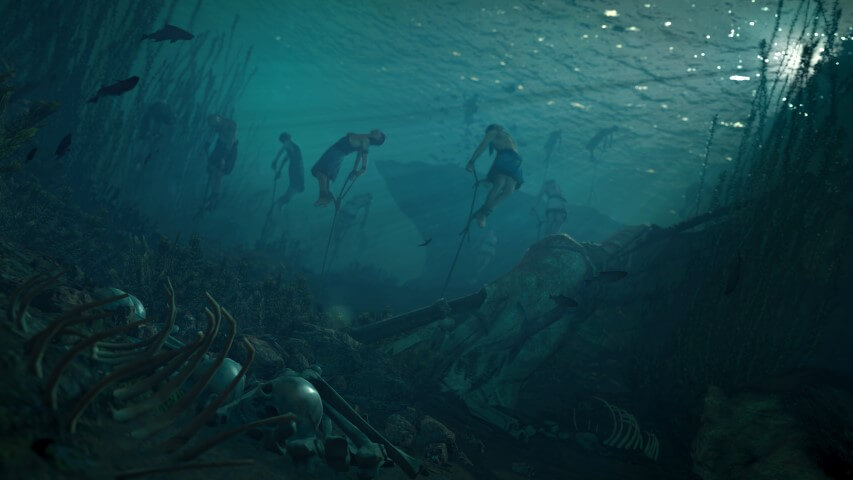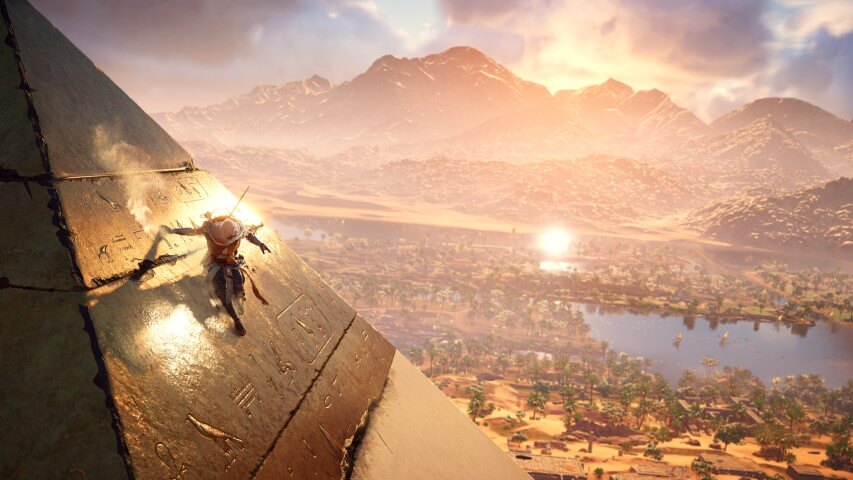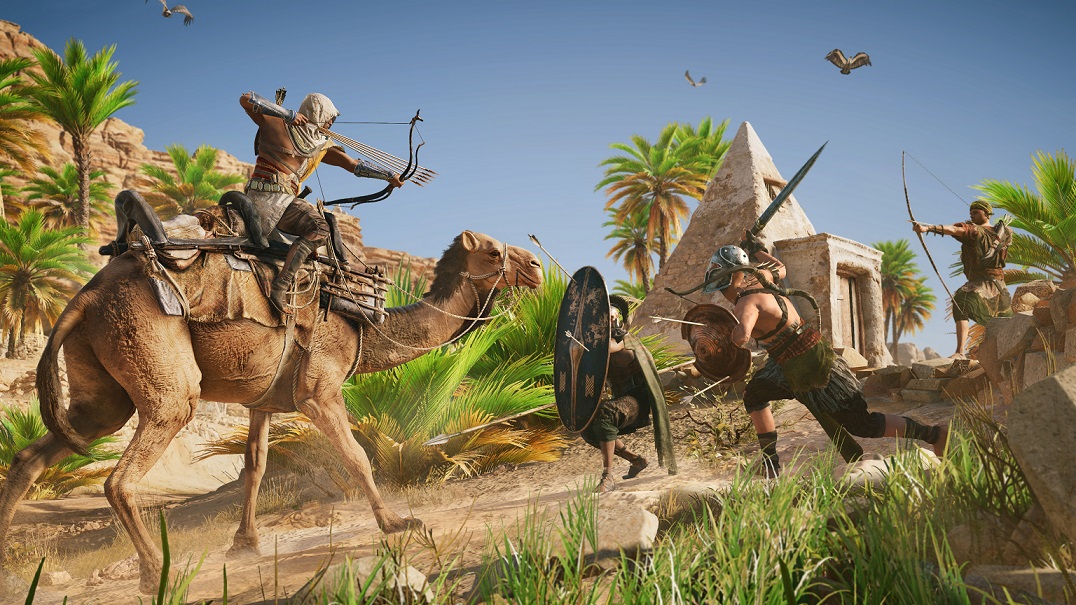Platforms:
Xbox One, PS4, PC
Released:
October 27, 2017
Publisher:
Ubisoft
Developer:
Ubisoft Montreal
Yearly franchises often cause players and developers to burn out after a certain point – after all, how many new and innovative ideas can you really create in such a short time period? While the Assassin’s Creed movie last year may have lead to a tepid response at best, the reinvention of the video game franchise that initially changed the way we play open world games is something we’ve all been keeping a close eye on. Assassin’s Creed Origins successfully takes the stealthy quest-filled formula and increases its depth, making for a much more organic experience that comfortably blends addictive RPG mechanics, solid story-telling and fun combat. It’s the reinvention the franchise so desperately needed.

Taking place in gorgeous ancient Egypt, Bayek is one of the most engaging and interesting protagonists that the series has had. He is a man who loves his wife and family and genuinely cares about the lands he is from and his history. Through flashbacks and small character moments, I found myself quickly liking him, which gave a lot more weight to the decisions I was making and the quests I chose to take on board. Other characters also fare well; it’s fun to see historic figures like Cleopatra encountered as the game progresses.
Elements where Assassin’s Creed was feeling somewhat stale have changed for the better. The ability to synchronize from a high vantage point is still present but it’s not going to case lots of tiny icons to appear on your map for you to individually track down. Exploring the very well-realized environment often times led me to fantastic loot to collect, tombs to explore and other side quests. It has a very organic feeling that has been missing from other Ubisoft open worlds over the years, where I really felt like I was on an adventure of discovery and wonder rather than just constantly tagging objectives and tracking them on my mini-map.
The sheer variety in the different types of quests you’ll come across is impressive. No longer just about assassinating high value targets and moving on, there are arena battles, investigation sequences where you try to piece together a murderous puzzle, ship combat and more. They aren’t just filler either. Often times I’d begin what I thought would be a simple quest – such as trying to find a woman’s missing husband, only for it to take several twists and turns before it was through, resulting in blurred lines around who I was really trying to help. Moments like these keep the story fresh and fun, even when you think you know what to expect.
Loot in Assassin’s Creed Origins also feels a lot more meaningful, further showing its RPG flair by providing you with multiple different weapon types with different strengths and weaknesses. It completely hooks you in with that addictive feeling of just a little more damage per second being worthwhile, and the ability to have interchangeable weapon options on the fly makes it very useful in battles where there are multiple different enemy types to worry about. It also makes these items entirely worth seeking out – not merely just a collectible for collectibles sake, but actual gameplay impacting tools, including a crafting system not unlike Far Cry where you’ll need to hunt animals to upgrade your gear.
None of these additions to the leveling of your character would mean much if the combat wasn’t up to snuff, but here it has been completely overhauled from the past AC games, for the better. It has a looser action RPG feel, as opposed to the sort of odd sticky magnetism we’re so used to after previous iterations. Gone are the days I would comfortably take on groups of ten or more enemies, knowing that I could likely just hit the counter button at the right times and never be too overwhelmed. Combat here requires thought and tactics, which is a nice change.
“…sweeping views from the top of a pyramid or diving down to explore the depths underwater never gets old…”
Mistiming a dodge or stuffing up a parry leaves you incredibly vulnerable to strong attacks, and some enemies are more than willing to make you pay for your mistakes. Having to think about shield breaks, positioning and combining that with the other foes that gather around you means you can’t just breeze through fight scenes. You have to really focus. It reminded me of the combat seen in the Dark Souls franchise, but obviously a lot more forgiving by comparison.
Despite the changes in combat, quest structure, exploration and RPG mechanics (which fit perfectly), the core of what made Assassin’s Creed so popular is still definitely present. Using stealth is still a preferable option to get the upper hand on your enemies, while there is still plenty of room to parkour your way around, climbing buildings with ease and allowing you to traverse almost anything. A range of mounts – including a camel – assist with travelling around the huge region, and I still appreciated that the main assassinations had multiple different avenues to complete them, whether it be running in for a big fight or thinking much more tactically about how to access a target behind a heavily guarded brigade.
Using Senu (your pet eagle) to explore areas from a literal birds-eye-view is also incredibly handy, whether it’s finding objectives or just marking enemies so you can plan your sieges effectively. It’s the equivalent of the drones in Ghost Recon Wildlands, and quickly becomes second nature so you can gather intel on your surroundings and makes complete sense within the AC universe, so it’s a nice touch.
Egypt is an absolutely perfect setting, and it’s one of the more breathtaking open worlds I’ve had the pleasure of exploring. Each location feels distinct and original, removing another previous criticism of the series where locations can all start to blend and feel the same. Taking in the sweeping views from the top of a pyramid, running through a small oasis or taking a boat out across a river so that you can dive down to explore the depths underneath never gets old, and it’s been lovingly crafted with a lot of detail. Towns feel living and breathing, full of culture and a range of characters, while dark, desolate tombs are claustrophobic with small details visible only with your torch. All in all it’s a visual triumph.
I also love the UI. Even completing a mission or finding a new area generates XP which then sweeps through your progress bar like sands in an hourglass, with a pulse of hieroglyphics surrounding your character. It makes every bit of progress feel rewarding and earned, and I love that they’ve included damage text with each hit on your enemies; I’m a sucker for it and they’ve done a great job with it here.
There is the occasional glitch (as is the case with games that have such a large scope), and there were moments that I got completely stuck in the environment, unable to move, which lead to either death or forcing me to fast travel out of the situation. I’m willing to forgive it given so much of the game feels so polished and complete.
Positive:
- Strong combat and RPG mechanics
- Egypt is absolutely gorgeous
- Protagonist is incredibly likable
- Varied, interesting side quests
Negative:
- Some glitches
- Stealth is unchanged (but hey it works)
Assassin’s Creed Origins is the breath of fresh air that the franchise so desperately needed. It genuinely feels like Ubisoft took the time to really think about where the franchise was going and address the concerns that we’ve had over the last couple of versions. The combat is wonderful, the effort put into making Egypt feel authentic and interesting is everywhere you look and Bayek is a strong, emotional and sometimes flawed character that you truly root for. Sure, it still has a bit of that convoluted Assassin’s Creed story that didn’t interest me much, but there is so much improvement overall to the core concept. If you felt burned out by the series before, Origins creates the perfect opportunity to dive back in and enjoy. A true reinvention, and I look forward to where the series goes from here.















